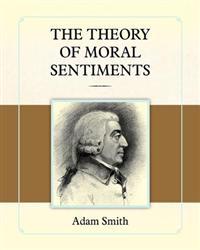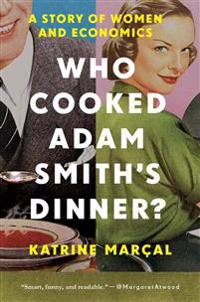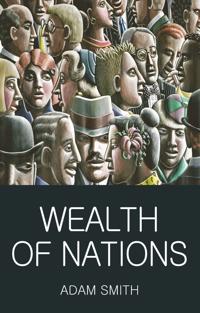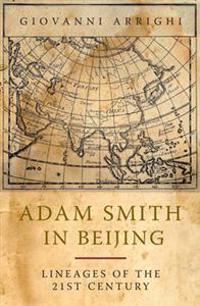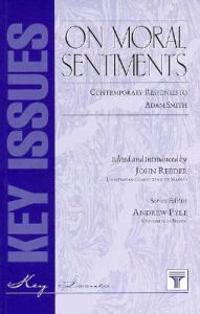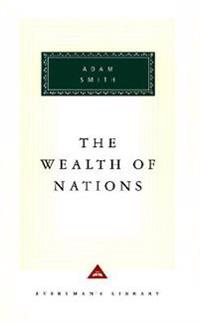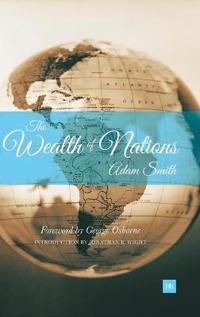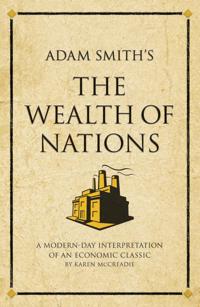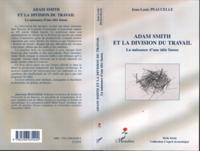An Inquiry into the Nature and Causes of the Wealth of Nations (Inbunden)
avCharles W. (EDT) Eliot, Adam Smith, C. J. Bullock
ISBN: 9781616400569 - UTGIVEN: 2010-02Who Cooked Adam Smith's Dinner?: A Story of Women and Economics
ISBN: 9781681771427 - UTGIVEN: 2016-06Nevertheless, the economic man has dominated our understanding of modern-day capitalism, with a focus on self-interest and the exclusion of all other motivations. Such a view point disregards the unpaid work of mothering, caring, cleaning and cooking. It insists that if women are paid less, then tha[...]
Who Cooked Adam Smith's Dinner?: A Story of Women and Economics (häftad)
ISBN: 9781681774442 - UTGIVEN: 2017-05How do you get your dinner? That is the basic question of economics. When economist and philosopher Adam Smith proclaimed that all our actions were motivated by self-interest, he used the example of the baker and the butcher as he laid the foundations for 'economic man.' He argued that the baker and[...]
Adam Smith (häftad)
ISBN: 9781780235684 - UTGIVEN: 2016-01Universally acknowledged as the father of capitalism, the eighteenth-century Scottish thinker Adam Smith (16 June 1723 - 17 July 1790) is best known for developing the concept of the 'invisible hand'. The 'hand' helped to explain how the removal of state regulation could set individuals free to spec[...]
Wealth of Nations (Häftad)
avAdam Smith
ISBN: 9781840226881 - UTGIVEN: 201207Adam Smith's Wealth of Nations is the first book of modern political economy, and still provides the foundation for the study of that discipline. Along with important discussions of economics and political theory, it mixes plain common sense with large measures of history, philosophy, psychology and[...]
Adam Smith in Beijing (Inbunden)
avGiovanni Arrighi
ISBN: 9781844671045 - UTGIVEN: 2007-11In the late eighteenth century, the political economist Adam Smith predicted an eventual equalization of power between the conquering West and the conquered non-West. Demonstrating Smith's continued relevance to understanding China's extraordinary rise, Arrighi examines the events that have brought [...]
Adam Smith in Beijing (Häftad)
ISBN: 9781844672981 - UTGIVEN: 2009-01In the late eighteenth century, the political economist Adam Smith predicted an eventual equalization of power between the conquering West and the conquered non-West. Demonstrating Smith's continued relevance to understanding China's extraordinary rise, Arrighi examines the events that have brought [...]
Who Cooked Adam Smith's Dinner? (Häftad)
avKatrine Marcal
ISBN: 9781846275647 - UTGIVEN: 2015-02An engaging, thought-provoking and accessible look at economics, equality and the mess we're in now
Who Cooked Adam Smith's Dinner?
ISBN: 9781846275654 - UTGIVEN: 2015-06It is not from the benevolence of the butcher, the brewer, or the baker, that we can expect our dinner, but from their regard to their own interestWhen Adam Smith wrote that all our actions stem from self-interest and the world turns because of financial gain he brought to life 'economic man'. Selfi[...]
On Moral Sentiments: Contemporary Responses to Adam Smith (häftad)
ISBN: 9781855065505 - UTGIVEN: 1998-01The Wealth of Nations (Inbunden)
avAdam Smith
ISBN: 9781857150117 - UTGIVEN: 1991-09Published in the same year as the American Declaration of Independence, The Wealth of Nations has had an equally great impact on the course of modern history. Adam Smith's celebrated defence of free market economics is notable also as one of the Enlightenment's most eloquent testaments to the sancti[...]
Saturn (Pocket)
avAdam Smith
ISBN: 9781905047864 - UTGIVEN: 2007-05The planet Saturn brings astrologers most of their clients. Saturn is the astrological ruler of fate and time, the decider of the difference between good and bad times in life, when we are heading for trouble and when that trouble will end. To identify our biggest current life problem, all we have t[...]
The Wealth of Nations (Inbunden)
avAdam Smith
ISBN: 9781905641260 - UTGIVEN: 200706"The Wealth of Nations" is a treasured classic of political economy. First published in March of 1776, Adam Smith wrote the book to influence a special audience - the British Parliament - and its arguments in the early spring of that year pressed for peace and cooperation with Britain's colonies rat[...]
Adam Smith's The Wealth of Nations (häftad)
ISBN: 9781906821036 - UTGIVEN: 2009-06Published in 1776, Adam Smith's The Wealth of Nations was the first comprehensive treatment of political economy. Today it is considered one of the most influential books ever written and its author is regarded as the father of classical economics. Smith did for economics what Darwin did for science[...]
An Inquiry Into the Nature and Causes of the Wealth of Nations (Häftad)
avAdam Smith
ISBN: 9781936041886 - UTGIVEN: 2011-01Adam smith et la division du travail
ISBN: 9782296175983 - UTGIVEN: 2015-06Au XVIIIe siecle, Adam Smith etudie la division du travail comme source d'immenses gains de productivite. L'auteur montre cependant que cette theorie est fausse et que l'expression "e;division du travail"e; designe mal une affectation des ouvriers a des postes, definis par des outils et des [...]
Adam Smith zur Einführung (häftad)
ISBN: 9783885066415 - UTGIVEN: 2007-10Adam Smith gilt als Vater der ?modernen? Ökonomie. Mit der Metapher der ?unsichtbaren Hand? schafft er die theoretische Grundlage einer auf Selbststeuerung beruhenden Marktwirtschaft, in der ein dem Markt innewohnender Automatismus stets zur optimalen Güterverteilung führen und damit die Wohlfahr[...]
Adam Smith für jedermann (Inbunden)
avHeinz D. Kurz, Richard Sturn
ISBN: 9783899812466 - UTGIVEN: 2013-04Adam Smith; økonom, filosof, samfunnstenker (Pocket)
avPeter Kurrild-Klitgaard
ISBN: 9788232101702 - UTGIVEN: 2013Adam Smith er verdenskjent som den økonomiske vitenskapens grunnlegger. Han var den første som i et større omfang kombinerte teoretiske betraktninger om grunnleggende samfunnsøkonomi med studier av hvordan mennesker innretter seg i det virkelige liv.
Samtidig gjorde Smith[...]Adam Smith (Häftad)
avPeter Kurrild-Klitgaard
ISBN: 9788757408096 - UTGIVEN: 2004-01Adam Smith er ´økonomiens fader´. Med afsæt i sin stilling som professor i moral filosofi skrev han økonomiske værker ind i samtidens politiske og samfundsmæssige diskurser. Dette gør ham til den første og den mest vidtspændende af ´Økonomiens Konger´.[...]
Nationernes velstand I+II (Inbunden)
avAdam Smith
ISBN: 9788775143092 - UTGIVEN: 2012Den skotske økonom og filosof Adam Smiths (1723-1790) hovedværk Nationernes Velstandmed originaltitlen An Inquiry into the Nature and Causes of the Wealth of Nation fra 1776 er den første analyse og beskrivelse af de frie markedskræfter. Værket anses for at være grundlaget for al m[...]


